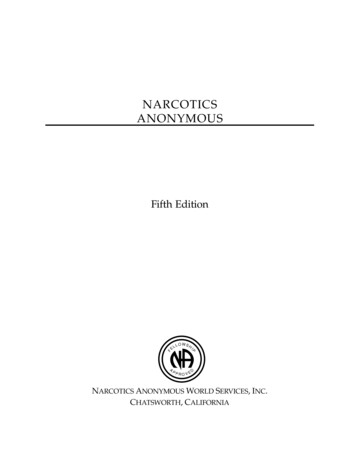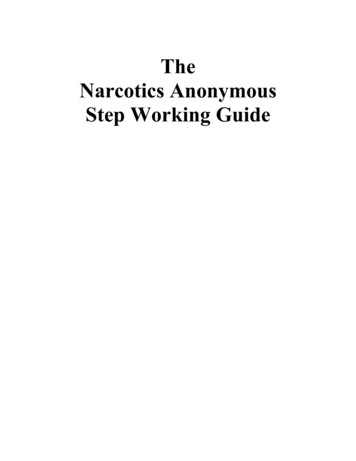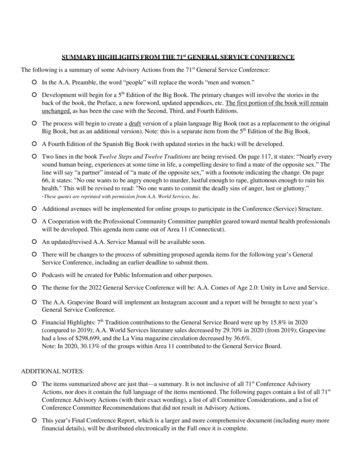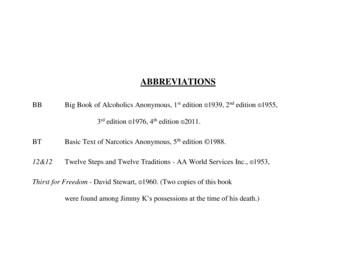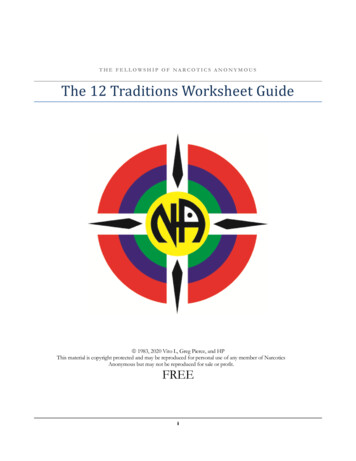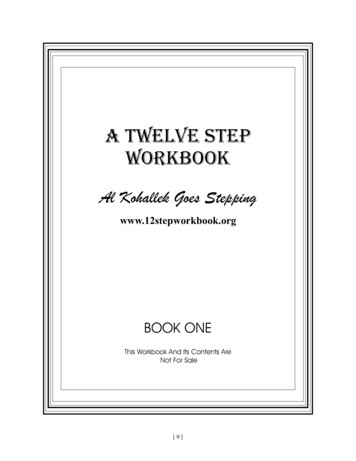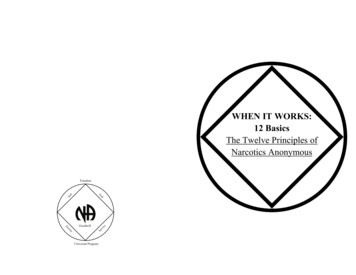
Transcription
WHEN IT WORKS:12 BasicsThe Twelve Principles ofNarcotics Anonymous
FORWARDThis piece of historical NA literature is now up for Input and Review. Thisdocument was discovered by Members of Home Groups on a historical NAarchive. The Members thought it was such a powerful piece of literaturethat it should be formatted into an accessible booklet, taken through the Inputand Review process, and shared with the NA world for free. After many, manyhours of working on retyping and formatting the document, it then wentthrough four workshops where this booklet was compared to the originaldocument to make sure every line matched up. The Groups involved in theseworkshops did a minimal amount of Input and Review where needed forgrammar, spelling, etc. The Groups changed as little as possible to preserve theoriginal document.A lot of mystery surrounded this piece for the Members and Groups involvedin this project. Many addicts from all over the world were asked forinformation on it; mostly wanting to know where this amazing piece ofliterature came from, and why the whole world did not have it on theirliterature table. Most sources pointed to one addict. This addict has given anincalculable amount of labor of love to our literature already though writingslike “The Twelve Traditions of NA” chapter in our Basic Text, our originalservice manual “The NA Tree,” the “Triangle of Self-Obsession” IP No. 12, aswell as many other valuable pieces of timeless NA literature. It is known thatthis addict believed in the spirit of Open Participation literature that goesthrough the Input and Review process like our Gray Book, and our originalBasic Text’s did. In that spirit of “labor of love” this piece of literature is nowoffered up to any and all NA Members and Groups wishing to participate inbeing a part of and sharing this literature with any addict seeking recovery.This is a Literary Work in progress. Please copy and share this with your localHome Group for Input and Review.Please send your input tonahelp.org@gmail.comThe original photo copied document can be found at:http://narchive.magshare.net/NArchive/Old Documents/When-It-Works-12Basics.pdf
WHEN IT WORKS: 12 BasicsThe seeds of the miracles of NA are found in the following principles. Eachprinciple is behind a step for an individual NA member, or a tradition for acollective body of NA members.345The Twelve Principles of Narcotics Anonymous1212. Sharing and caring is the active and passive forms of love that keeps us aliveand allowing god to use us as instruments.293011. Unconditional love is given where we sense our spirit in another human being.2810. Humility is knowing the importance of doing our part well and being open tothe many forms of help required for a full and abundant life.26279. Patience is taking time for things to move into place without force or breakage.258. Tolerance is knowing the other person has the same spirit in them as us andbeing curious about what that spirit is trying to do.23247. Faith is the evidence of our trust in God. True faith is the result of surrendercoupled with experience that God can and will do for us if we ask for help.21226. Willingness to try is the beginning of doing our part. However grand or humblethat might be, it is a state of readiness replacing depression and anxiety.19205. Open-mindedness is our bridge to the experience of others. It is thepassageway out of loneliness into the life of the Spirit.17184. Honesty is the ability to match up our insides with our outsides. It allows whatwe don’t care about to go away and what we really want to appear and developin our lives.1415163. Acceptance allows evasion and denial to give way to reality and peace. Withthe care of God, we are granted the power to welcome new people and ideasinto our lives.1112132. Surrender to the things we cannot change through our own power is a way toget on with our lives. We seek a Higher Power of our own understanding andthat becomes our ultimate guide and a source of strength.89101. Hope gives us something positive to look for and move towards. We can admitour need for help as we begin to share in our common welfare.67WWW.NAHELP.ORGAnonymi FoundationP.O. Box 4404Allentown, PA 18105Copyright 08/02/2020 byThe Anonymi FoundationDeveloped and Distributed by the Groups inA.S.I.S (Alternative Service Informational Stuctuture) for NA,The Anonymi Foundation.Literary Work in progress. Please copy and share this with yourlocal Home Group for Input and Review.Please send your input tonahelp.org@gmail.comWWW.NAHELP.NL1
Principles are the language of miracles. Increasing our language abilityhelps us make the right choices. Our minds often play tricks on us, due toour disease, and we use spiritual principles as guidelines out of the tricks.These principles can be mimicked but unspiritual people lack certaincharacteristics associated with spiritual growth. We each have to reach apoint of surrender to enter the state we call ‘recovery.’ In NA, we have ourown spiritual awakening, and this gives us our own evidence of the realityof the God of our understanding. We have to have our own miracles forspirituality to be real to us. Without principles, it is easy to fall back intoour comfortable rationales where most of the world is wrong and we, poorisolated victims, are lost in a world of fools. We learn to create words todescribe what is going on in our hearts so others can help us and so we canhelp ourselves. Recovery is getting back with humanity.12345678910111213Spiritual growth is discovering ways to put principles into action. To growspiritually requires three things: surrender, learning, and practice. We havefound that maintaining our spiritual condition is the best safeguard againstrelapse. Our spiritual condition determines the quality of our life.Regardless of our station in life, it is possible to achieve a great state ofmind and spirit. Many of our members spend a great deal of time in ourmeetings and functioning as part of our active service structure. Others goabout their business in good faith and show their gratitude for recoverythrough personal service. Personal service is helping addicts seekingrecovery.14As we grow in recovery, unanticipated differences of viewpoint developfrom newly acquired information. When we begin to apply it, we discoverways to reconcile what we have learned with what we have known beforethe situations around us. Pretending that these differences don’t exist willensure that they dominate us. Secrets have great power. We see this happenin any area of our lives where we are not free to openly discuss our feelings.While it may be a simple matter to resolve in open discussion, when wewon’t even admit something is wrong, it takes on the enduring quality ofstone. Until we found recovery, the inability to come out into the open withliving problems has kept addicts in prisons of their own making. Just the242151617181920212223252627282930313233
12fact that there are others who share our concerns, sets us free from feelingthat we are alone.One thing that will doom us to stagnation in recovery is an attitude ofindifference towards spiritual principles. When we are young in recovery,the world is full of uncertainty and discovery. We are forced to summon ourinner reserves to learn about getting clean and staying clean. We are reallytrying and really listen to what others have to say. We read spiritualliterature and expect to find new answers to help us reorient ourselves to theclean life. When we think we know the answers, we float into indifference.We know we don’t really know all the answers, but we have been clean awhile and there is no one to tell us to get real anymore. Intolerance is whenwe do the same thing to other people. We discount the fact that they are33In keeping with our growth as a Fellowship and the spiritual nature of ourprogram of recovery, it must be noted that we cannot serve two masters. Weare spiritual first, and everything else second. We cannot allow the forcesof worldly concerns to erode our spiritual love and caring. We want tomaintain our sensitivity and sincerity as our worldwide Fellowship grows.If we are to survive the incredible and emotional strains of our growth, wewill always have to look to our roots to remain on sound spiritual ground.These roots have to do with the memories we each have of the excitementand happiness we felt when we finally realized that NA could indeed grantus a new life. There, experiences put us all on equal ground in service aswell as in recovery. They are our reference point for understanding whatand why we do what we do the way we do it.23The Twelve Principles listed in the Fourth Chapter of the Basic Text,Narcotics Anonymous, are the keys to joining the steps with the traditions.It is easier to avoid the pitfalls that come with practicing a spiritual way oflife against the stains of everyday reality. Too often good members havebeen pitted against one another where they have common cause in stayingclean and helping others. Many times, simple misunderstandings havegrown into grave conflicts entirely disproportionate to the original issues.Stubbornness and close-mindedness prolong conflict. Communication mustintervene lest nature take its 293031323grow beyond ourselves into the wisdom of a clear, open spirit of goodwilland sensibility in the service of abiding in the spirit. Our Fellowship willendure.12344
03132otherwise delusional person successful. In secret, this person may also bea great giver. Spiritual principles are more real than the rationales used tojustify our active addiction. Many doors closed to us will only yield afterwe apply spiritual principles.How often have we seen a member in the midst of a glowing recoverysuccumb to greed, lust, pride, avarice, envy, hatred or anger? Howeverconvincingly they justify their actions, they all run into impassableobstacles. Nor can they overcome obstacles by applying more force orarguing the correctness of their position. We share about remaining stuckuntil we surrender to our powerlessness. We share how the application ofthis principle works in all areas of our lives. Constantly living by spiritualprinciples exhibits as awakened spirit. During times of hardship we sit insilent wonder over the beauty in our lives and the company we share. Weendure without making things worse, each time discovering as areawherein we lack surrender, discovering a truth in the situation andgrowing a little freer, aligning ourselves with the powerful force thatworks for us. It is neither defeat nor an end to our pursuit of happiness. Itis the way to happiness. This is life on life's terms.Spiritual reality does not apologize for its ways, without it, there would beno escape. The delusions or our disease produce defects that arrest growth.Most obstacles would have been simple were we not addicts. Theyprevented a timely, clear lesson. The marvel is that through recovery weregain what has been lost.clean and trying, even in difficulty, to make sense of their lives and findtheir way out of their traps.1Instead of floating in a sea of uncertainty, we can begin moving forward indirections of our choice. Many lost dreams have only waited in the darknessof our memories. Many times, we will find ourselves waking up torediscover forgotten feelings or lost goals that had become impossible inactive addiction. Principles are what guide us around the pitfalls and awayfrom the thin ice where reality cannot support us. We get on an honestfooting with reality and it supports us. If there were really something terribleout there, waiting to get us, it has surely had its chance. We find that wehave to act on the opportunity in front of us on a daily or moment-bymoment basis to be able to see ahead to the next opportunity. If we do notdo what’s in front of us, we feel ourselves falling behind. If this happens,all we have to do is ask the God of our understanding for help to get backon the recovery road. Principles give us words to describe functional partsof our new reality. They all come from a spiritual focus inside our being.Without this focus, the principles fall back into being mere words withoutthe spiritual force, like a candle without a flame. It is scary to experiencethis.3245678910111213141516171819We all find we need help. This is what we do in our meetings when we getbeyond withdrawal and the obsession to use is lifted from us. Most all NAmembers can remember times when the program seemed unreal, unsafe anduncertain. They got past the crisis and continued going to meetings andfound their objections were just one more effort to return to active addiction.2025Personally seeking to make one's mark in NA entitles the member to aseries of unnecessary mistakes. Caring and sharing suspends our personalagenda. Through loving service, caring and sharing, God allows us toEnrichment describes the way members bring their current personalexperience into the rooms of NA to share what they are finding with others.This stops short of endorsing outside issues, but valid experience is whatkeeps NA alive and growing. We carry our program with us into any areaof our new lives. What we discover is brought back and shared with othermembers and may become part of the spoken or written body of the materialwe all draw in recovery. This way any experience any of us has thatencourages or enhances an addict’s chance of staying clean or living a betterlife gets taken into our meetings and shared out to those who may find it434Through sharing and caring we gain the ability to do for others what wasonce done for us. We can each remember the patience and love that keptus coming back. Now, awakened and based in principles, we carry themessage of hope and recovery. This is as crucial for someone working aTwelfth Step as studying and grasping the disease concept in the FirstStep. We cannot remain clean without it.212223242627282930313233
1234useful. This does not mean that we tell members to go to our therapist, ourchurch, or another support group. We can share what we learned there andhow it interested us or helped us in our recovery. The process of twelvestep recovery is amazingly resilient and absorptive of this sort of input.Among all our principles, we find ideas like inclusiveness, openness, trust,helpfulness, selfless-giving, and caring help offset our addict's tendency todo the opposite. Our self-destructiveness opposes the principles that bringpeace and happiness to the willing. These words are from the recoverylanguage within NA. The currency of our program is a language born ofdeep, applied love and commitment that has endured great pain andhardship.Spiritual principles can seem tenuous or wishy-washy to those who havelittle experience with them. It may be a fixation on reality that makes anHope is to desire something reasonable and attainable. The desire forrecovery was unreasonable and unattainable for us until we found NA.29Ultimately, we find out in our own way. Narcotics Anonymous is thegathering of addicts who desire to stay clean and grow spiritually. On adaily basis, many ideas, experiments, changes, conflicts, polarization andfailures are filtered through tests of application that produce our Program.When they work, they extend our ability to apply the NA program. If not,we move on, leaving behind what does not work. With our emphasis onsharing and caring, we have a life. After our needs are met -- food, shelter,clothing and solvency -- crisis may siphon time from these things yet wediscover we return to them to keep our house in order. Our loved onesneeds, reasonable, come first. After living requirements are met, we havethe opportunity to selflessly give by sharing. This sharing happens as thefruit of our existence, however restricted or marginal. Our sharing is not abenefit of the material world, it is a benefit of the spirit. Generosity is thenature of our loving God, as we share an opportunity to reflect divine calmand trust.Since our origins as a program and Fellowship, one common elementprovided for our common welfare: hope. Hope for recovery. Hope that theobsession will someday be lifted. Hope that the program is for real. Hopethat things will start making sense. Hope for ourselves and others. Whenan addict attends an NA meeting and hears a message of hope, their abilityto admit their need for help begins. Hope is catching, in a sense, and canbe transmitted by spiritual interaction.27“Hope is to faith as desire is to willingness.”20HOPE19PRINCIPLE ONE18The principles we explore in this chapter relate both to the Twelve Stepsand the Twelve Traditions. There was an old idea that behind each NA stepand Tradition was a common principle. The idea is that the individualexpression of the principle is in the step and the collective expression is inthe Tradition. Admission of our addiction and the foundation of ourcommon welfare both rest on our hope 17From the computer field we hear, “Information overload equals patternperception.” A member might share some pain and anger from childhoodthat came out in a group therapy session. It is absurd that this memberwouldn’t say where the event took place. We can share these things withoutendorsing outside enterprises or expressing opinions on outside issues. Theworld is our preserve in recovery. No door is closed to us, why then wouldwe shut ourselves in unless we were fearful, once again, of losing control.1156789101213141516212223242526285We become aware that our program results from a huge amount ofdeliberate, consistent effort on the part of all of our members. As the hoursof scheduled meetings approaches, how many thousands of automobilesare started for the express purpose of attending an NA meeting? Howmany light switches are thrown, and chairs arranged to seat our multitude?In a day, how many hours do members share? Travel in the Fellowship isconvincing because we hear the same principles working for other people,far from where we live. Change comes to members exposed to the greaterNA beyond the boundaries of their local 25262728293031323342
1PRINCIPLE TWELVE2SHARING AND 8293031''Sharing and caring is the active and passive forms of love thatkeeps us alive and allows God to use us as instruments. “The spiritual principle of sharing occurs when we provide an addict withwhat is needed. Each member shares in our signature way from thebeginning of recovery. Sharing is the follow through that takes place aftercaring begins. It validates the NA promise: freedom from active addictionfor any addict thoroughly applying these principles. Sharing takes placebetween addicts with a desire for recovery. Caring brings about incidentsof sharing.Anonymity from Step Twelve is the absence of labeling, possessing thebeauty of acknowledging our Higher Power as the primary force in ourlives. It creates the environment we need to recover. We can shed oldlabels that may no longer apply. However, our personality remains todilute the experience with the idea of our "having to run the show.” Withego set aside, the spirit within us is allowed to emerge untainted bypersonal desire. We can experience the miracle of personality changeenhanced by anonymity.Regardless of their condition, newcomers are welcomed. The onlyrequirement for membership is their desire to stop using, remain clean andlive a new way of life. Few of us are comfortable judging the newcomer'ssincerity. Our terrific ability to mask who and what we are from intrudingeyes is an ability we retain in recovery. It is part of our survival skills. Fartoo often, the assessment between one or two members has been crucial ina newcomer's recovery. Fortunately, it only takes one to carry ourmessage. This is part of the awakening experience of our Twelfth Step, anelement of the Step's maturation as we grow. Applications of principlesare endless - our need for surrender, belief, inventory, confiding, lettinggo, and amends builds a healthy life. Our inability to live such principlesis a measure of our illness.41Those who have gone before us had this desire and it is the same desire forrecovery that makes us members today. Hope keeps us alive and vital as aFellowship. Hope wards off negativity and apathy. While hope may seemintangible to some, its effects are profoundly visible. You can tell bylooking at someone that they are hopeful. It is at the head of our list ofspiritual principles because with hope, problems don’t seeminsurmountable. Anticipation of things getting better can be the beginningof fulfillment.We know when we feel hopeless; solutions are apt to appear distant andunlikely. A lot of us in NA learn to give and receive hope from oneanother at the onset of our recovery. When we feel hopeful, our sense ofsecurity, optimism and self-reliance eliminate many of our concerns andhelp us deal with the rest. On the other hand, hopelessness breeds despairand the simplest things can seem overwhelming. As a principle, hopebecomes something to be treasured. Like any treasure, there are those whowould steal what they could have honestly. As a fundamental part of ourrecovery, NA members are asked to avoid any act that would threaten todampen or extinguish hope in the hearts of our members.123456789101112131415161718Hopelessness has its hallmarks also. Dejection, despair, desperation,despondency, discouragement can result in an incapacity for hope. Whenwe feel these things in recovery, we learn to realize spiritual principles arebeing violated in some way that affects us. In this way, principles mayguide us out of our hopelessness.19Policies ensuring every member is capable of having a voice in NA havebeen a part of our Traditions and Service Structure since we first began togrow as a Fellowship. In the early seventies, dreams began which wererealized by the creation of our World Service Conference in 1975. Even inour earliest days, the efforts to begin and carry the NA message werealmost entirely dependent on the hope that a better way was possible foraddicts. The value of the hope offered by these ‘open door’ policies wasmade apparent by a series of efforts where the ‘door’ was closed to all buta few. The failure of these efforts and the feelings of hopelessness amongthe many waiting on the few, proved to be a severe test for our Fellowship.24620212223252627282930313233
Where hope and a sense of purpose prevails, we addicts begin to learnfeelings long lost to most of us through our active addiction. At times, wemay feel almost too buoyant, too enthusiastic. Our aspirations may exceedwhat is possible for us - yet often in recovery today’s dream is tomorrow’sreality. Without a dream, we may have no tomorrow. A sense of hopeallows us to discuss matters that may be unpleasant or make usuncomfortable. When disorders occur, we suffer until we get back to theNA way: Steps, Traditions, and Principles. Hope helps us surrender to the1st Step.33Perhaps one more condition should be brought into this rare and inspiringform of love. It is that we do share from our own experience and notwander into the role of savior. Our spiritual condition is important: Godworks the miracles and gets the credit, not us. The trap here is that if wesee ourselves as the doers, even if we really help someone, we will sustainan injury to our spirits. The love we give does not create indebtedness inthose we help. It would be a case of our pushing God away from thecontrolling role in our lives, canceling out our Third Step of recovery. Wewill find ourselves seeking greater challenges, isolated and eventually inserious need of help ourselves.There are at least two ways to learn this lesson: give in to the temptationand violate spiritual principles or avoid violating our structure and itsprinciples. It is easy to do one and requires great faith to do the other.Where we fall into error, a public Tenth Step among our membership, isthe best way to stop the disorder and gain the forgiveness we need fromothers. The Tenth Step puts closure on the harm done. Rule breakingalways risks harming others and should be avoided by earnest study andmeditation.24As our trust, confidence, and faith grows, so does our sense of hope.Exploitation of our members, falsification of minutes and reports,controlled elections and manipulations of group conscience have causedmany of our members to lose hope. In this sense, hope as a principle maygive some of us the clarity we need to avoid doing these things when theymay seem desirable or important. Blindness to the effects of our actions onothers makes talk of God and hope seem unimportant and unrealistic at thetimes when we need help the most.16Another condition is that the time is right for sharing. A person doingthings that are bound to have disastrous results from our view, may thinkthey're in no need of help. Any effort on our part beyond a gentlecomment may seem insulting and egotistical. If we wait until they're inpain and desperation, they may pass beyond all help. All we can do isshare our experience, strength and hope. By praying to be ready andavailable, we are sometimes there at the exact moment when a person isopen to help and asks for it.We can withstand some adversity because it is familiar ground for most ofus. To have our sense of hope and assurance threatened not only dampensour spirits but can lead to a sense of utter abandonment - a dangerousplace for recovering addicts. Hope allows us to take our first Step, thoughit may be so small as to go almost unnoticed. Hope allows us to make thesurrenders we each must face if we are to grow in recovery. Hope is alsothe basis of our First Tradition. We would have no common welfarewithout 3031327Also, setting ourselves up as saviors makes us ideal targets for the diseasein others to find fault with us. Our failure to be perfect can be used by theaddictive trait to discredit our recovery! Our only perfection consists ofhonest and complete surrender. Then, if we are attacked, we can laugh atthe strange turn of events and the foolishness that makes hard the best ofintentions.The gathering of spiritual knowledge leads eventually to a great andlasting simplicity. Our love may be a reflection of that simplicity. We maydo the right thing just because it seems like the thing to do!Love expands our life. Hatred restricts it. Through love, we can go moreplaces, meet more people agreeably and do more things with them.Increasingly, hatred cuts us off from others, leads us to avoid certainplaces and limits our ability to 627282930313240
1234heart of things. In many cases, we back off, knowing we're powerless. Inmany other cases, we are able to act on faith and play the roles of helpers,caring listeners, truth tellers, principled persons, selfless givers andoccasionally take stands that are spiritually meaningful.One addict shares simply: “Hope is a small word but a big thing, and if itwasn’t shown to me through NA, I think I might have died.”PRINCIPLE To do these things, we turn a portion of our attention inward and begin toask questions about what we believe and why we do things. Along theway, our understanding passes a point where we realize the love,generosity and help we have received - yet were unable to recognize oracknowledge. After this realization, our attitude towards the needs andsuffering of others is more generous. Realizing how much we've beenhelped makes us feel embarrassed not to pass on what others gave us. Theidea of pride, arrogance or expectation of return becomes ridiculous wherewe can see ourselves as the holders of spiritual truths that came directlyfrom the God of our understanding. We cannot personally claim God'sgrace.Awareness of the loving nature of the reality that surrounds us doesn'tblind us to the ignorance, cruelty and selfishness that go on with orwithout us. Our roles can reflect our new viewpoints and generalawareness. We become able to see differently. Our insight enables us tomake loving choices within our means and based on extending the kind oflove and caring that helped us find the clean life.The limitations of language obscure the sometimes-painful fact that even‘unconditional love’ is dependent on certain factors beyond our control.This love may be in our hearts yet unable to find expression. Receipt ofthis love usually depends on our openness.One condition is that the person we would enjoy helping is open to ourhelp. We are all too familiar as addicts with the pain of well-intendedintrusion. Sometimes we feel like an exhibit at the zoo. To intrude onsomeone unasked is presumptuous and more likely to trigger retaliationthan gratitude.39SURRENDER“Surrender to the things we cannot change through our own power is away to get on with our lives. We seek a Higher Power of our ownunderstanding and that becomes our ultimate guide and source ofstrength.”Our submission is voluntary and grants immediate relief from antagonism,hate, counterplotting, rivalry, and all the ways we are otherwise at crosspurposes with life. Surrender is positive for us because we have hope, andmany others to turn to, whatever our dilemma. We do not barter goodtreatment for non-using. Where new members have gotten that impression,they get loaded as soon as something does not go their way. We need tocarefully explain to newcomers that our 1st Step means we acknowledgewe cannot use regardless of events or the actions of other people.Surrender is a personal event. It is the beginning of personalresponsibility.In keeping with our NA 12 Steps and 12 Traditions, it becomes obviousthat the recovery process of Narcotics Anonymous won’t work without anindividual capacity for surrender. Surrender qualifies as a pri
Aug 02, 2020 · 12 Basics 1 The Twelve Principles of Narcotics Anonymous 2 The seeds of the miracles of NA are found in the following principles. Each 3 principle is behind a step for an individual NA member, or a tradition for a 4 collective body of NA members. 5 1. Hope gives us something positive to lo

